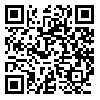Sat, Jan 31, 2026
| فارسی
Volume 12, Issue 2 (Summer 2010)
Advances in Cognitive Sciences 2010, 12(2): 59-68 |
Back to browse issues page
Download citation:
BibTeX | RIS | EndNote | Medlars | ProCite | Reference Manager | RefWorks
Send citation to:



BibTeX | RIS | EndNote | Medlars | ProCite | Reference Manager | RefWorks
Send citation to:
Salehzadeh M, Kalantari M, Molavi H, Ebrahimi A. Effectiveness of Cognitive–Behavioral Group Therapy on Depression in Intractable Epileptic Patients (with Focusing on Dysfunctional Attitudes in Epilepsy) . Advances in Cognitive Sciences 2010; 12 (2) :59-68
URL: http://icssjournal.ir/article-1-108-en.html
URL: http://icssjournal.ir/article-1-108-en.html
1- Psychology, Isfahan University, Isfahan, Iran.
2- Associate Professor, Isfahan University, Isfahan, Iran.
3- Professor, Isfahan University, Isfahan, Iran.
4- Assistance Professor, Behavioural Sciences Research Center, Medical University of Isfahan, Isfahan, Iran.
2- Associate Professor, Isfahan University, Isfahan, Iran.
3- Professor, Isfahan University, Isfahan, Iran.
4- Assistance Professor, Behavioural Sciences Research Center, Medical University of Isfahan, Isfahan, Iran.
Abstract: (3302 Views)
Objective: Depression is the most prevalent co-morbid disorder in epilepsy and determines the highest variance in quality of life scores of patients with epilepsy. Cognitive-behavior therapy (CBT) is the most effective psychotherapy method for treatment of depression. The purpose of this project was to determine the efficacy of cognitive behavioral therapy on the depression of intractable epileptic patients in Isfahan; while focusing on dysfunctional attitudes related to epilepsy.
Method: 20 patients with chronic, poorly controlled seizures and mild to moderate clinical depression were randomly assigned to one experimental (N=10) and one control (N=10) group. Eight weekly sessions of CBT with focus on cognitive restructuring, modification of cognitive distortions and training of behavioral techniques was administered to the experimental group. Hamilton scale for depression (HRSD) was used as the pre-test and post- test for both two groups.
Results: Data analysis showed a significant post-test decrease in depression scores in the experimental group.
Conclusion: Cognitive-behavior therapy (CBT) with focus on dysfunctional attitudes related to epilepsy, is remarkably effective as a complementary therapy in reduction of co-morbid depression in epileptic patients.
Method: 20 patients with chronic, poorly controlled seizures and mild to moderate clinical depression were randomly assigned to one experimental (N=10) and one control (N=10) group. Eight weekly sessions of CBT with focus on cognitive restructuring, modification of cognitive distortions and training of behavioral techniques was administered to the experimental group. Hamilton scale for depression (HRSD) was used as the pre-test and post- test for both two groups.
Results: Data analysis showed a significant post-test decrease in depression scores in the experimental group.
Conclusion: Cognitive-behavior therapy (CBT) with focus on dysfunctional attitudes related to epilepsy, is remarkably effective as a complementary therapy in reduction of co-morbid depression in epileptic patients.
Type of Study: Research |
Subject:
Special
Received: 2010/02/20 | Accepted: 2010/04/21 | Published: 2010/06/22
Received: 2010/02/20 | Accepted: 2010/04/21 | Published: 2010/06/22
Send email to the article author
| Rights and permissions | |
 |
This work is licensed under a Creative Commons Attribution-NonCommercial 4.0 International License. |



